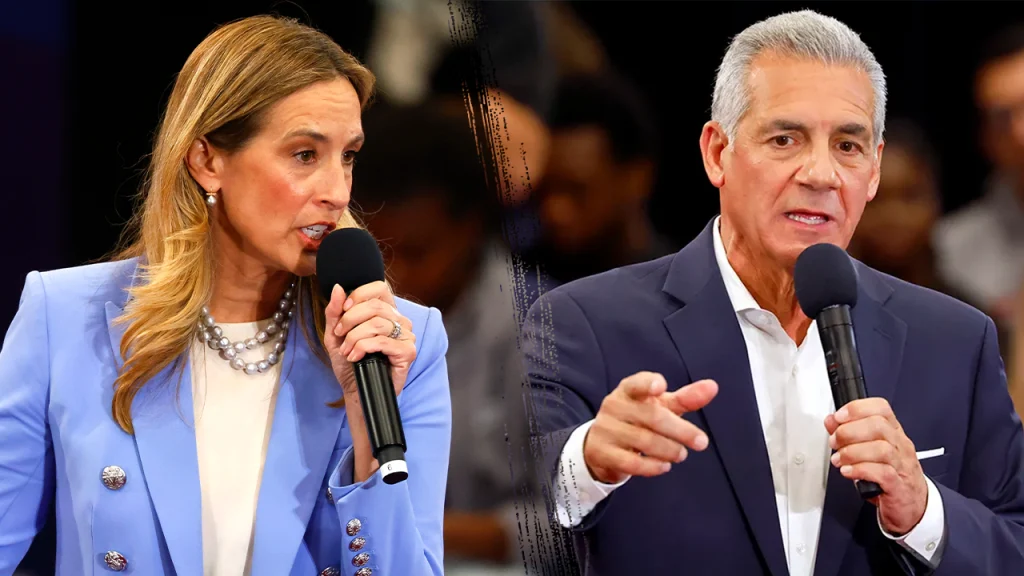Naval Academy Cheating Scandal Controversy Erupts in New Jersey Gubernatorial Race
In the heat of New Jersey’s gubernatorial race, Republican candidate Jack Ciattarelli and Democratic nominee Rep. Mikie Sherrill are embroiled in a controversy that has captured national attention. At the center of the dispute is Sherrill’s involvement in a 1994 U.S. Naval Academy cheating scandal, which recently came to light alongside allegations of improper access to her military records. The situation has quickly evolved into a politically charged debate, with Democrats and Republicans offering starkly different interpretations of what happened and who bears responsibility.
According to a New Jersey Globe report, Sherrill was barred from walking at her Naval Academy graduation ceremony for refusing to report classmates involved in a major cheating scandal. When confronted with evidence that her name was missing from the commencement program, Sherrill acknowledged, “I didn’t turn in some of my classmates, so I didn’t walk but graduated and was commissioned as an officer in the U.S. Navy, serving for nearly ten years with the highest level of distinction and honor.” This confirmation came after the Ciattarelli campaign had submitted a Freedom of Information Act (FOIA) request that verified her absence from the graduation program. The controversy deepened when it was revealed that Nicholas De Gregorio, described by the Ciattarelli campaign as a friend not directly affiliated with the campaign, had separately submitted a FOIA request for Sherrill’s military background information.
The situation escalated dramatically when the National Archives and Records Administration admitted that a technician had improperly released Sherrill’s entire military record in response to De Gregorio’s request. This unauthorized disclosure included sensitive personal information such as her Social Security number. A spokesperson for the National Archives acknowledged the error, stating the technician “should NOT have released the entire record,” and promised accountability for the breach. Despite requests to destroy the improperly obtained documents, the Ciattarelli campaign has refused to do so, while maintaining they were not part of any conspiracy to smear Sherrill and that their own separate FOIA request was legitimate and properly conducted.
Democrats have responded forcefully to the records breach, characterizing it as a deliberate political attack orchestrated by the Trump administration. DNC Chair Ken Martin described it as “yet another example of Donald Trump and the Republicans illegally weaponizing the federal government for political purposes,” while House Minority Leader Hakeem Jeffries expressed support for a criminal investigation. Other prominent Democrats including California Governor Gavin Newsom, Arizona Representative Mark Kelly, and Pennsylvania State Representative Malcolm Kenyatta joined the chorus of criticism, with Kenyatta calling it “illegal doxxing” and “blatant corruption.” These accusations frame the incident as part of a pattern of political targeting rather than an administrative error by a low-level employee.
The Ciattarelli campaign has vigorously rejected these characterizations, arguing that Democrats are attempting to distract voters from the substance of Sherrill’s involvement in the Naval Academy cheating scandal. They maintain that the documents detailing Sherrill’s role in the scandal were not part of the National Archives breach and that Sherrill effectively confirmed the allegations herself when responding to the New Jersey Globe. Through legal representation, the campaign has warned that continued accusations of illegal behavior would be considered defamatory, stating: “Contrary to your client’s baseless claims, no one leaked anything to the campaign to try to smear [Sherrill]. Had they done so, we would not be waiting for her to release the records of her involvement in the cheating scandal.”
This controversy illustrates the increasingly combative nature of American political campaigns, where candidates’ personal histories and the methods used to uncover them can become as contentious as policy positions. Sherrill has framed the situation as “an illegal and dangerous weaponization of the federal government,” criticizing both Ciattarelli and the Trump administration for “breaking the law and exposing private records for political gain.” Meanwhile, the National Archives has apologized for the breach and committed to holding staff accountable, though this has done little to calm the political storm. As the New Jersey gubernatorial race continues, this incident highlights the tension between legitimate public interest in candidates’ backgrounds and the ethical and legal boundaries of opposition research, especially when it involves military service records that contain sensitive personal information.
The White House has not responded to requests for comment on Democrats’ accusations regarding the Trump administration’s alleged role in the records breach. Meanwhile, multiple House Democrats have called for formal investigations, including members of New Jersey’s congressional delegation and the ranking member of the House Oversight Committee. As this story continues to unfold, it represents not just a local campaign dispute but a flashpoint in broader national debates about government transparency, privacy protections, and the proper conduct of political campaigns in an increasingly polarized environment.


